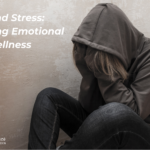Four mental health behaviours that lower self-esteem. Many people think the key to boosting their low self-esteem is understanding the cause. It can be helpful to some extent to pinpoint the cause of your poor self-esteem, but there is one even more important realisation: It’s your current behaviours that maintain your low self-esteem, not the things that caused it in the past.
As a therapist, I’ve seen people struggle with low self-esteem because they constantly get stuck in thought patterns that cause them to feel bad about themselves.
Four mental health behaviours that lead to low self-esteem can significantly improve overall well-being.
Let’s dive into these habits you may be unaware of eroding your self-esteem.
- Getting Stuck in the Past: Everyone makes errors. Reflecting on these mistakes is essential for growth and learning, but it gets difficult when you find it difficult to let go. Rehashing past mistakes over and over again might make you feel vulnerable to failure and lower your self-esteem. Instead, focus on the lessons learned, use them, and continue. Remember that reflecting on a mistake until you learn from it is more beneficial than continuously thinking about it. “The past can’t hurt you anymore, not unless you let it.” ― Alan Moore
- Constantly Stressing About the Future: Fear and anxiety about the future can be crippling and skew your perception of your capacity to deal with obstacles in life. It’s critical to distinguish between unreasonable worries and practical planning for prospective problems. While planning for the future is a good idea, worrying constantly might make you feel unable, leading to lower self-esteem.
“Worry is a misuse of the imagination.” ― Dan Zadra
- Rehashing prior Injuries: Rehashing prior injuries can result in ongoing rage, resentment, and victimisation, all of which hurt your self-esteem. It’s important to learn to forgive and move on, not just for the sake of the person who injured you but also for your peace and development. Remaining bound to the past prevents you from moving forward and limits your ability to have a happier life. “Forgiveness is an act of the will, and the will can function regardless of the temperature of the heart.” ― Corrie Ten Boom
- Gaslighting Yourself by Criticising Your Emotions: Gaslighting your own emotions can result in feelings of instability and a decline in self-esteem. You are a person, thus, it’s acceptable to feel. For instance: You’re making yourself feel insane when you call yourself “weak” or cry about something that happened long ago. Everyone experiences anxiety and indecision occasionally (even if they don’t always admit it to themselves), so why do you criticise yourself for feeling that way during a business meeting? Instead of berating yourself for having a certain emotion, try to comprehend it better. As a natural part of your human experience, accept them. Develop self-compassion and remember that feeling different emotions is normal and not something to be ashamed of.
Addressing these mental health behaviours can be the first step towards improving your self-esteem and overall mental well-being. Remember, progress takes time and seeking help along the way is okay.
But how can you break free from these mental health behaviours and improve your self-esteem?
Here are a few strategies:
- Mindfulness training: Mindfulness trains us to concentrate on the here and now. It aids us in letting go of regrets from the past and anxiety about the future. Instead, we develop the ability to deal with and accept things as they are. You can practise mindfulness by engaging in yoga or meditation or setting aside time each day to pay attention to your environment and sensations.
- Fighting Back Against Negative Thoughts: When you concentrate on past transgressions, fretting over the future, or severely critiquing oneself, fight back against these thoughts. Do you need this thought? Is it correct? What supporting data do I have for this assertion? By doing this, you may boost your self-esteem and remove yourself from negative thought habits.
- Repeating positive phrases to yourself to counteract negative thoughts is known as using positive affirmations. They can improve your self-esteem and assist you in creating a more positive self-image. For instance, if you think, “I always mess things up,” you could consider, “I learn and grow from my mistakes.”
- Seeking Professional Help: Consulting a professional counsellor may be beneficial if you’re having trouble overcoming these mental patterns alone. A therapist or counsellor can offer you methods and tactics to control these behaviours and raise your self-esteem.
- Developing Self-Compassion: Self-compassion entails being kind and sympathetic towards yourself, especially when you’re going through a trying moment. Your self-esteem considerably increases when you learn to accept your feelings without passing judgement.
I feel strongly that stress and anxiety can be managed with a certified life coach and a life coach near me. Stress management strategies can help you with daily ups and downs and overthinking and worry.
Never forget that raising your self-esteem is a journey rather than a final goal. So be kind to yourself and remember that it takes time and practice these mental health behaviours. And always keep in mind that asking for assistance is acceptable. Read reviews from my clients and book a free assessment call with me.
Life will always have its ups and downs, but with the right tools and mindset, you can make the journey worthwhile. Embrace the power within, cherish every moment, and let’s sail towards a stress-free horizon. Get in touch if you want to chat.










